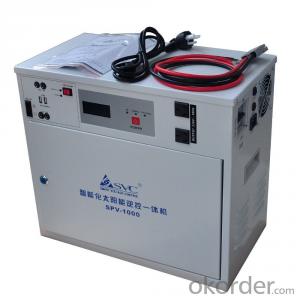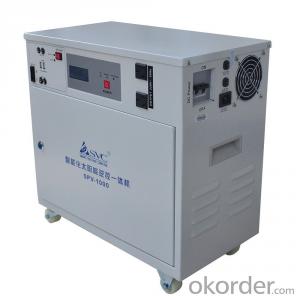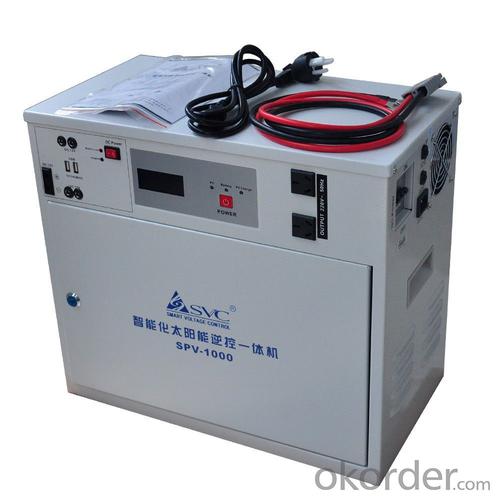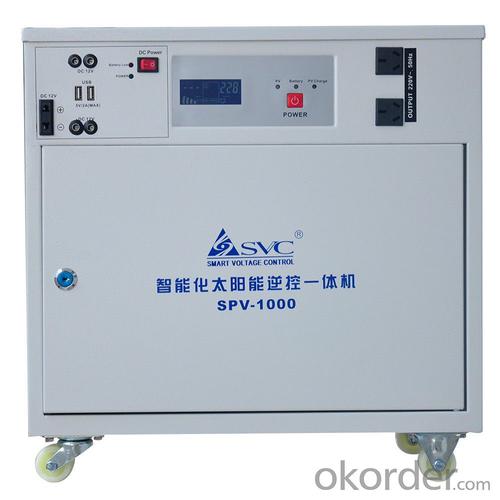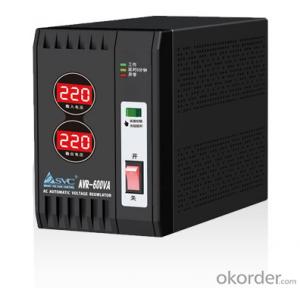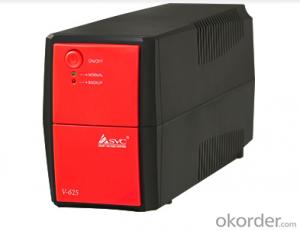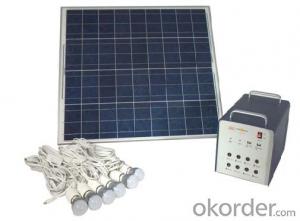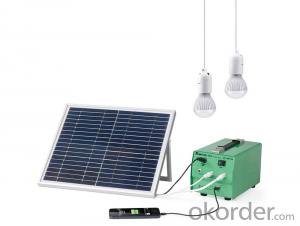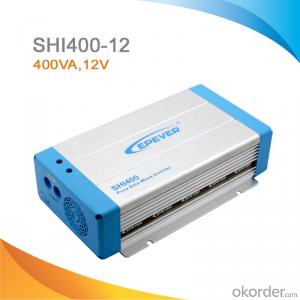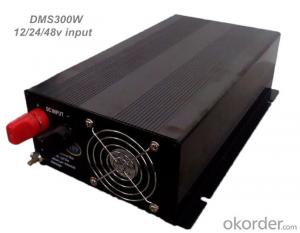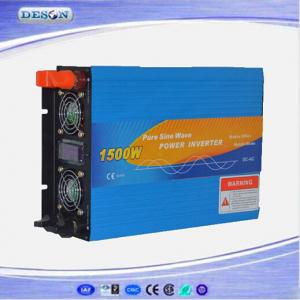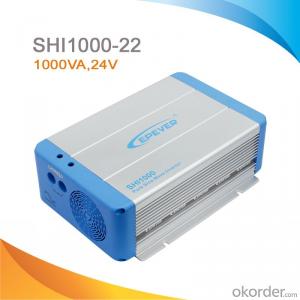Huawei Solar Energy Systems - All-in-One 480W Pure Sine Wave AC/DC Output LCD/LED 12V/24V Solar Power System
- Loading Port:
- China main port
- Payment Terms:
- TT OR LC
- Min Order Qty:
- 20 carton
- Supply Capability:
- 10000 carton/month
OKorder Service Pledge
OKorder Financial Service
You Might Also Like
ALL-IN-ONE 480W Pure Sine Wave AC/DC Output LCD/LED 12V/24V Solar Power System

| Model | SPV-600 | SPV-800 | SPV-1000 | SPV-1500 | |
| Rated power: | 360W | 480W | 600W | 1000W | |
| storage battery: | 12V(optional:24V) | ||||
| specifications of charging | |||||
| charging mode | PV charging and mains charging | ||||
| PWM solar controller: | voltage | 12V(optional:24V) | |||
| current | 30a(Max)(depends on the power of solar panels) | ||||
| PV maximm voltage | 12V system(potional:24V system) | ||||
| 25V | |||||
| hybrid charging | PV charging current:when I>15A,AC charging current is off | ||||
| PV charging current:when I>15A,AC charging current is 5A | |||||
| PV charging current:when I≤15A,AC charging current is 10A | |||||
| DC output system | |||||
| Charging port /USB | 5V/2A(Total)/ 2 units | ||||
| output port of DC | 12V/1.5A/ 3 units | ||||
| AC Mode | |||||
| Input voltage | 145-275VAC | ||||
| Input frequency | 48-54Hz(50HZ),Same s AC | ||||
| Output voltage | 200-240VAC | ||||
| Short Circuit | Breaker | ||||
| Inverter Mode | |||||
| Output voltage | 220VAC±5% | ||||
| Output frequency | 50±1% Hz(Auto detection) | ||||
| Output P.F | ≥0.6 | ||||
| Output wave form | Pure Sine Wave | ||||
| Transfer time | Typical 2-6ms,10ms max | ||||
| Overload capability | 110% Shut down within 60sec. | ||||
| 120% Shut down within 5sec. | |||||
| Short Circuit | ≥20ms System shut down automatically | ||||
| priority principle of mains and inversion | intelligent and automatic recongnition | ||||
| protection | protectings of output overload,output short circuit,inpot over voltage,input under voltage and over-temperature | ||||
| specifications of the overall unit | |||||
| dimension(mm) | 455*250*400 | ||||
| Net weight(KG) | 11 | 12 | 14 | 16 | |
| Gross weight(KG) | 12.5 | 13.5 | 16 | 18.5 | |
| display | display mode | LCD+LED | |||
| display information | LCD:working and protection status of inerter,charging status of storage battery | ||||
| LED:indications of working status and PV charging | |||||
| ENVIRONMENT | |||||
| ENVIRONMENT | indoor,or outdoor with waterproof measures | ||||
| Environment of performance: | Temperature 0℃~40℃,Humidity 20%~90%,non condensing | ||||
| Noise Level | Less than 40dB(lm) | ||||
Product Description
 Product introduction:
Product introduction:
High quality low frequency pure sine wave inverter
PWM solar controller
DC power system
Field of application
Solar hybrid photo voltaic system, which possess automatic recognition, intelligent switch over function:applicable to areas where electricity bills are expensive or environmental protection area since this system can transfer solar energy into power efficiently and save mains, like, household solar/wind power system, street lamp soar/wind power system etc.
Detail Description
easy to install, users just need to connect solar panels and batteries to fish installation
Intelligent CPU controlled, modular composition
LED or LCD display, specifications and status of charging and operation are displayed in a direct way, which is convenient to operate
Multifunctional integrated machine, customers don’t need to buy extra controller, charger, AVR, etc.
Room had been reserved for standard configuration of battery(100AH) inside the machine, ans it can also connect to external battery pack to prolong back time. (according to residential sunshine and wind energy source, customers can require a matching number of battery packs)
Applicable to all kinds of loads, like, motors, air conditioners, electronic drills, fluorescent lamps, gas lamps etc.
Apply low frequency pure sine wave circuit design, high stability, low failure rate with a long operational life span(more than 5 years), and easy to maintain.
Protections of low voltage, over voltage, over-temperature, short circuit, overload etc
Process DC power system, which can provide environment power to LEDs, DC fans, radios, mobile phones and other consumption equipment
Details: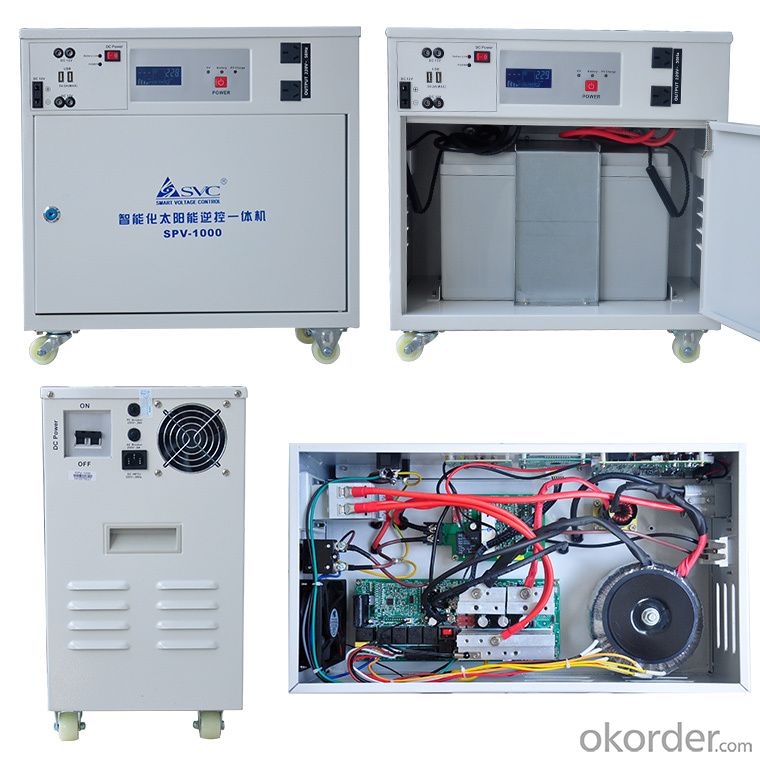
- Q: How do solar energy systems affect the aesthetics of a building?
- Solar energy systems can impact the aesthetics of a building in both positive and negative ways. On one hand, well-designed solar panels can be visually appealing and can enhance the overall architectural design of a building. They can provide a modern and eco-friendly look, especially when integrated seamlessly into the structure. On the other hand, some people may find solar panels to be unsightly, especially if they are not properly integrated or if they significantly alter the original design of the building. Ultimately, the effect on aesthetics depends on the design, placement, and integration of the solar energy system.
- Q: Can solar energy systems be used in powering research laboratories or scientific facilities?
- Yes, solar energy systems can be used to power research laboratories or scientific facilities. Solar panels can be installed on the roofs or grounds of these facilities to convert sunlight into electricity. This renewable energy source can provide a sustainable and reliable power supply, reducing dependence on traditional electricity grids and minimizing the carbon footprint of these facilities. Additionally, solar energy systems can be integrated with battery storage solutions to ensure continuous power supply even during periods of low sunlight or power outages.
- Q: How do solar energy systems impact energy resilience during natural disasters?
- Solar energy systems can significantly enhance energy resilience during natural disasters. These systems provide a reliable and independent source of electricity, enabling critical infrastructure and essential services to continue functioning even when the main power grid is disrupted. Solar panels can continue generating electricity as long as there is sunlight available, reducing the reliance on fuel-dependent generators and minimizing the risk of fuel shortages during emergencies. Additionally, solar energy systems can be paired with battery storage, allowing excess energy to be stored and used during nighttime or cloudy periods. This combination ensures a continuous power supply, enabling emergency response efforts, communication networks, and healthcare facilities to operate, thereby enhancing overall energy resilience during natural disasters.
- Q: What is the impact of tree shade on the performance of solar panels?
- The impact of tree shade on the performance of solar panels can be significant. When solar panels are shaded by trees, their ability to convert sunlight into electricity is greatly reduced. This is because shade prevents direct sunlight from reaching the panels, reducing their overall efficiency. Shade on solar panels can create a phenomenon known as "partial shading," where only a portion of the panel is shaded. In this case, the shaded portion of the panel acts as a barrier, preventing the unshaded portion from producing electricity at its maximum capacity. This results in a decrease in the overall energy production of the solar panel system. Tree shade can also cause an imbalance in the output of solar panels that are connected in series. When one panel is shaded, it can significantly reduce the performance of the entire series, as the shaded panel acts as a bottleneck for the flow of electricity. This can lead to a decrease in the overall energy generation of the solar system. It is worth mentioning that the impact of tree shade on solar panels depends on various factors such as the intensity and duration of the shade, the orientation and tilt angle of the panels, and the efficiency of the panels themselves. Additionally, advancements in solar panel technology, such as the use of bypass diodes in modern systems, can help mitigate the negative effects of shading to some extent. To optimize the performance of solar panels in the presence of tree shade, it is important to consider the placement and design of the solar panel system. This may involve trimming or removing trees that cast shade on the panels, adjusting the tilt angle of the panels to minimize shade impact, or considering alternative locations for the installation of the panels where shade is less of a concern. Overall, tree shade can have a significant impact on the performance of solar panels, reducing their efficiency and energy production. It is crucial to carefully consider the effects of shade when planning and designing a solar panel installation to maximize its effectiveness.
- Q: Can solar energy systems be used for agricultural purposes?
- Yes, solar energy systems can be used for agricultural purposes. Solar panels can be used to generate electricity to power irrigation systems, lighting, and other farm equipment. Additionally, solar energy can be used for heating water for livestock or crop processing. It is a sustainable and cost-effective solution for farmers to reduce their reliance on traditional energy sources and reduce their carbon footprint.
- Q: Can solar energy systems be used for large-scale power generation?
- Yes, solar energy systems can be used for large-scale power generation. Advances in technology and decreasing costs have made it increasingly feasible to deploy solar panels on a larger scale, such as solar farms or utility-scale solar power plants. These systems utilize multiple solar panels to capture sunlight and convert it into electricity, which can then be integrated into the grid to meet the power needs of a significant number of homes, businesses, or even entire communities. Additionally, the scalability of solar energy systems allows for their implementation in various geographical locations, making them a viable option for large-scale power generation worldwide.
- Q: Can solar energy systems be used in areas with limited access to financing options?
- Yes, solar energy systems can be used in areas with limited access to financing options. There are various alternative financing options available such as leasing, power purchase agreements, and community funding that make solar energy more accessible to people in areas with limited financing options. Additionally, government incentives and subsidies can also help reduce the financial burden of installing solar energy systems in such areas.
- Q: How long does it take to install a solar energy system?
- The time it takes to install a solar energy system can vary depending on factors such as the size of the system, complexity of the installation, and the availability of equipment and manpower. However, on average, a typical residential solar panel installation can take anywhere from one to three days.
- Q: Can a solar energy system be installed in an area with limited sunlight?
- Yes, a solar energy system can be installed in an area with limited sunlight. While solar panels are most effective in areas with abundant sunlight, they can still generate electricity even in areas with less sunlight. The efficiency of the system may be lower, but it can still provide a renewable energy source. Additionally, advancements in solar technology, such as the use of more efficient panels and energy storage solutions, can help optimize the system's performance in areas with limited sunlight.
- Q: What is the impact of tree shading on solar energy system performance?
- The impact of tree shading on solar energy system performance is significant. Trees can block sunlight from reaching the solar panels, reducing their efficiency and overall energy production. Shading can cause uneven distribution of sunlight, leading to hotspots and potential damage to the panels. Additionally, tree debris such as leaves and branches can accumulate on the panels, further obstructing sunlight and requiring regular cleaning. Proper tree management and placement of solar panels are crucial to maximize the performance and output of solar energy systems.
Send your message to us
Huawei Solar Energy Systems - All-in-One 480W Pure Sine Wave AC/DC Output LCD/LED 12V/24V Solar Power System
- Loading Port:
- China main port
- Payment Terms:
- TT OR LC
- Min Order Qty:
- 20 carton
- Supply Capability:
- 10000 carton/month
OKorder Service Pledge
OKorder Financial Service
Similar products
Hot products
Hot Searches
Related keywords
